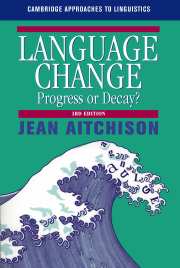Book contents
- Frontmatter
- Contents
- Preface
- Part 1 Preliminaries
- Part 2 Transition
- 4 Spreading the word
- 5 Conflicting loyalties
- 6 Catching on and taking off
- 7 Caught in the web
- 8 The wheels of language
- 9 Spinning away
- Part 3 Causation
- Part 4 Beginnings and endings
- Symbols and technical terms
- Notes and suggestions for further reading
- References
- Acknowledgments
- Index
8 - The wheels of language
Grammaticalization
from Part 2 - Transition
- Frontmatter
- Contents
- Preface
- Part 1 Preliminaries
- Part 2 Transition
- 4 Spreading the word
- 5 Conflicting loyalties
- 6 Catching on and taking off
- 7 Caught in the web
- 8 The wheels of language
- 9 Spinning away
- Part 3 Causation
- Part 4 Beginnings and endings
- Symbols and technical terms
- Notes and suggestions for further reading
- References
- Acknowledgments
- Index
Summary
Abbreviations are the wheels of language, the wings of Mercury. And though we might be dragged along without them, it would be with much difficulty, very heavily and tediously … Words have been called winged … but compared with the speed of thought, they have not the smallest claim to that title … What wonder, then, that the invention of all ages should have been … to add such wings to their conversation as might enable it, if possible, to keep pace in some measure with their minds.
John Horne Tooke, The diversions of Purley (1786)Words, like cliffs, erode over time. Latin mea domina ‘my lady’ changed to French ma dame. French ma dame became madam. Madam has become ma'am, and even 'm, as in Yes'm. Words with lexical content empty out, then get attached to others. The word full as in ‘a basket full of apples’ has became a compound, as ‘a spoonful of sugar’, and also an affix, as in hopeful. Similar examples can be found in almost every sentence.
This pruning-down process is known as grammaticalization or grammaticization, a term coined by the French linguist Antoine Meillet, who defined it as ‘the attribution of a grammatical character to a previously autonomous word’. The process is allpervasive. ‘Grammaticalization … is in fact probably the source of the majority of grammatical changes that languages undergo’, it has been claimed.
- Type
- Chapter
- Information
- Language ChangeProgress or Decay?, pp. 112 - 119Publisher: Cambridge University PressPrint publication year: 2000



